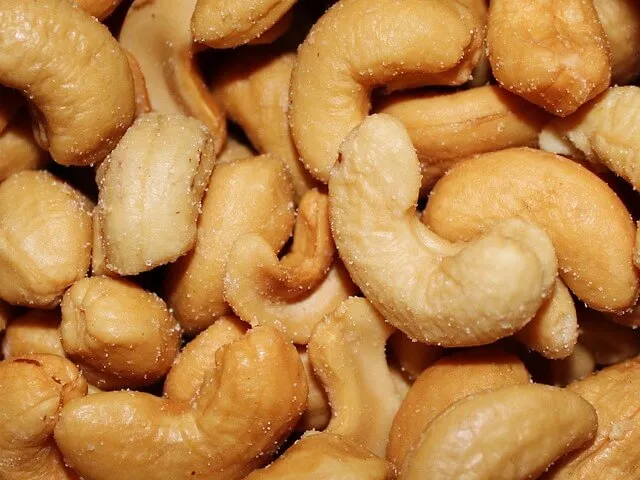Are Cashew Nuts a Natural Anti-Depressant
Going Nuts may be the answer to combat Depression
Cashew nuts are crescent-shaped nuts that are native to Brazil and have a sweet flavor. They are mineral rich and do not contain cholesterol. The little fat they contain is the good kind in the form of oleic acid. They can be enjoyed as a snack or can be used in cooking like adding them to a stir fry.
These nuts have a lot of health benefits that are said can help to prevent cancer, lower blood pressure and improve hair growth.
The article goes into more detail about the nutrition and health benefits of cashew nuts. It also talks about the fat content and what type you should buy.
The following article suggests that cashew nuts are also used as an anti-depressant.

Would you rather eat cashews or take anti-depressants?
Two handfuls of cashews are the therapeutic equivalent of a prescription dose of Prozac. Inside you, the essential amino acid L-tryptophan is broken down into anxiety-reducing, snooze-inducing niacin. Even more important, tryptophan is also made into serotonin, one of your body’s most important neurotransmitters.
Serotonin gives a feeling of well-being and mellowness, or as the Australians would say, “no worries.” This is such a profound effect that Prozac, Paxil and similar antidepressants usually either mimic serotonin or artificially keep the body's own serotonin levels high. You can do the same thing with your food. And no one can tell us that beans, peas, cheese, nuts and wheat germ are toxic if you eat a lot of them!
Plenty of carbohydrates (starches) in your meals help tryptophan get to where it does the best: in your brain. In order to cross the blood-brain barrier to get in, carbos are required. So cheese and crackers provide a better effect than the cheese standing alone. An egg or two on toast is better than just the egg. Beans, peas, and nuts already contain carbohydrates, so you are all set there.
Consider that five servings of beans, a few portions of peanut butter, or just one big handful of cashews provides one to two thousand milligrams of tryptophan, which will work as well as prescription antidepressants… but don't tell the drug companies. Some skeptics think that the pharmaceutical people already know.
What to look for when buying Cashew Nuts and Other Health Benefits
Learn what other nutritional values and health benefits these nuts have. Find out about the fat content and what type of cashews you should be buying.
Cashew Nutrition
Popping that handful of cashews will not only boost your tryptophan levels, but it is also just the start of the health benefits of cashews. A single ounce of raw, unsalted cashews showcases an impressive array of raw minerals, ready to nourish the cells of your body. These minerals are potassium, phosphorus, calcium, magnesium, iron, sodium, manganese, zinc, copper and selenium. Cashews are also rich in folate and vitamin K.
Heart Health
Research shows that eating more nuts, such as cashews, can lower your risk for cardiovascular disease. This may occur by reducing blood pressure and “bad” cholesterol levels. Nuts are naturally cholesterol-free and contain good amounts of heart-healthy fats, fiber, and protein. They also contain arginine, which protects the inner lining of artery walls.
Other vitamins and minerals in nuts, like potassium, vitamins E and B6, and folic acid, also help to fight heart disease.
Blood Health
The copper and iron in cashews work together to help the body form and utilize red blood cells. This in turn keeps blood vessels, nerves, the immune system, and bones healthy and functioning properly.
Eye Health
We’ve all heard that carrots are good for your eyes, but it might come as a surprise that cashews are too! They contain high levels of lutein and zeaxanthin, which act as antioxidants when consumed regularly. These compounds protect the eyes from light damage (which can turn into blindness in the elderly), and can even help decrease the instance of cataracts.
Too much Fat Content?
Cashews contain a lot of fat. The good news is that these fats are mostly monounsaturated and polyunsaturated.
When substituted for saturated fats and eaten in moderation, mono- and polyunsaturated fats can help improve heart disease as well as reduce the risk for stroke and prevent weight gain.
Polyunsaturated and monounsaturated fats also contribute vitamin E to the diet. Vitamin E is a powerful antioxidant that is great for promoting positive cell growth and overall health in the human body.
Buying Cashew Nuts
Obviously, you want your cashews raw, so avoid the roasted ones in the can. You will always find them shelled since the shell of the cashew nut contains a caustic resin called cashew balm, which is not fit for consumption. This resin is used to produce varnishes and insecticides.
Look for plump, ivory-colored nuts that are free of spots, mold, shriveling or pitting. If possible, smell the cashews to make sure they are not rancid.
Source:
